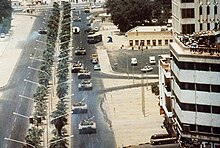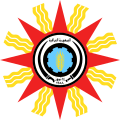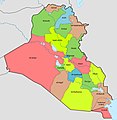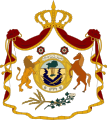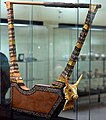The Iraq PortalA view of Erbil, Iraq
Iraq, officially the Republic of Iraq, is a country in West Asia and a core country in the geopolitical region known as the Middle East. With a population exceeding 46 million, it is the 35th-most populous country. It consists of 18 governorates. The country is bordered by Turkey to the north, Saudi Arabia to the south, Iran to the east, the Persian Gulf and Kuwait to the southeast, Jordan to the southwest, and Syria to the west. The capital and largest city is Baghdad. Iraqi people are diverse; mostly Arabs, as well as Kurds, Turkmen, Yazidis, Assyrians, Armenians, Mandaeans, Persians and Shabakis with similarly diverse geography and wildlife. Most Iraqis are Muslims – minority faiths include Christianity, Yazidism, Zoroastrianism, Mandaeism, Yarsanism and Judaism. The official languages of Iraq are Arabic and Kurdish; others also recognized in specific regions are Assyrian, Turkish, and Armenian. Since its independence, Iraq has experienced spells of significant economic and military growth alongside periods instability and conflict. The region remained a part of the Ottoman Empire until the end of World War I, after which Mandatory Iraq was established by the British Empire in 1921. It gained indepdence as the Kingdom of Iraq in 1932. Following a coup d'état in 1958, Iraq became a republic, led by Abdul Karim Qasim followed by Abdul Salam Arif and then Abdul Rahman Arif. The Ba'ath Party came to power in the 1968 and ruled as one-party state, under the leadership of Ahmed Hassan al-Bakr, followed by Saddam Hussein, who started major wars against Iran and Kuwait. In 2003, the Iraq War started after the United States-led coalition forces invaded Iraq and overthrew Saddam. The war subsequently turned into an insurgency and sectarian civil war, with American troops withdrawing in 2011. Between 2013 and 2017, Iraq was once more in a state of war, with the rise and subsequent fall of Islamic State. Today post-war conflict in Iraq continues at a lower scale, which has been an obstacle to the country's stability. (Full article...) Selected article -The Iraqi invasion of Kuwait began on 2 August 1990 and marked the beginning of the Gulf War. After defeating the State of Kuwait on 4 August 1990, Iraq went on to militarily occupy the country for the next seven months. The invasion was condemned internationally, and the United Nations Security Council (UNSC) adopted numerous resolutions urging Iraq to withdraw from Kuwaiti territory. The Iraqi military, however, continued to occupy Kuwait and defied all orders by the UNSC. After initially establishing the "Republic of Kuwait" as a puppet state, Iraq annexed the entire country on 28 August 1990; northern Kuwait became the Saddamiyat al-Mitla' District and was merged into the existing Basra Governorate, while southern Kuwait was carved out as the all-new Kuwait Governorate. By November 1990, the adoption of UNSC Resolution 678 officially issued Iraq an ultimatum to withdraw unconditionally by 15 January 1991 or else be removed by "all necessary means" from Kuwaiti territory. In anticipation of a war with Iraq, the UNSC authorized the assembly of an American-led military coalition. After Iraq failed to meet the UNSC's deadline, the coalition pursued the directive to forcefully expel Iraqi troops from Kuwait by initiating the Gulf War aerial bombardment campaign on 17 January 1991. As the bombardment campaign continued over the next month, Iraq fired missiles at Israel; the Iraqi government had hoped that an Israeli retaliation would prompt the coalition's Muslim-majority states to rescind their support for the campaign against Iraq. However, no such retaliation took place, and the coalition began a ground invasion of Iraqi-occupied Kuwait and parts of Iraq on 23 February 1991. As Iraqi troops retreated from Kuwait, they set fire to over 700 Kuwaiti oil wells, but this strategy was ultimately unsuccessful in thwarting the coalition's advance. By 28 February 1991, the Iraqi military had been devastated and Kuwaiti independence was restored. (Full article...) Selected picture
Old building in Nineveh Did you know...
Selected biography - Muhammad Baqir al-Sadr (Arabic: محمد باقر الصدر, romanized: Muḥammad Bāqir al-Ṣadr; 1 March 1935 – 9 April 1980), also known as al-Shahid al-Khamis (Arabic: الشهيد الخامس, romanized: al-Shahīd al-Khāmis, lit. 'the fifth martyr'), was an Iraqi Islamic scholar, philosopher, and the ideological founder of the Islamic Dawa Party, born in al-Kadhimiya, Iraq. He was father-in-law to Muqtada al-Sadr, a cousin of Muhammad Sadeq al-Sadr and Imam Musa as-Sadr. His father Haydar al-Sadr was a well-respected high-ranking Shi'a cleric. His lineage can be traced back to Muhammad through the seventh Shia Imam Musa al-Kazim. Muhammad Baqir al-Sadr was executed in 1980 by the regime of Saddam Hussein along with his sister, Amina Sadr bint al-Huda. (Full article...)
General imagesThe following are images from various Iraq-related articles on Wikipedia.
ListsTopicsCategoriesRelated portalsReligions in Iraq Arab states Other countries WikiProjectsThings you can do
Associated WikimediaThe following Wikimedia Foundation sister projects provide more on this subject:
Discover Wikipedia using portals | ||||||||



